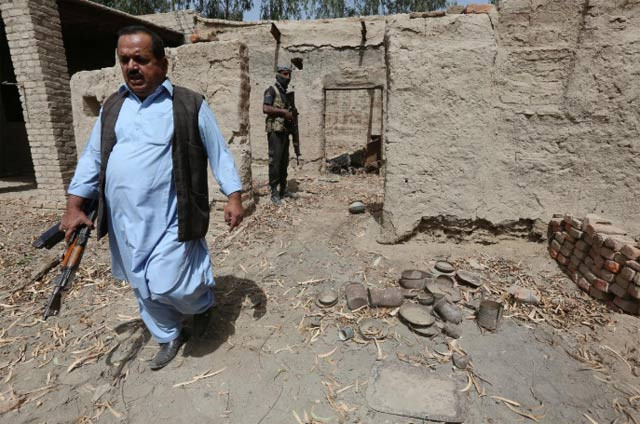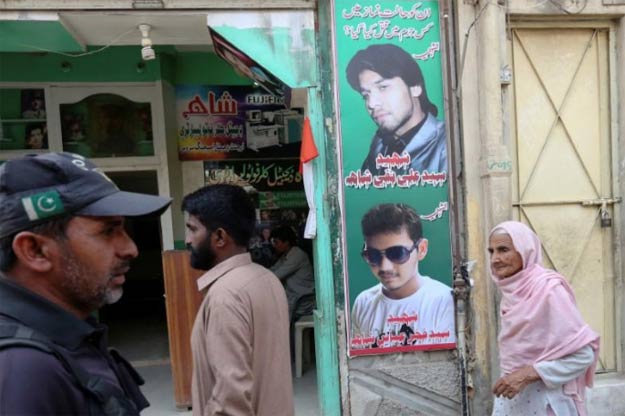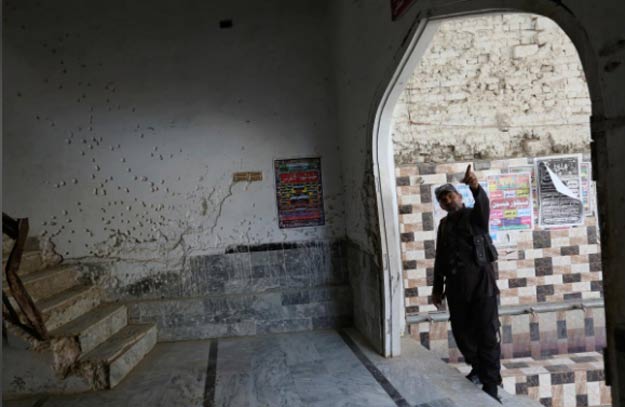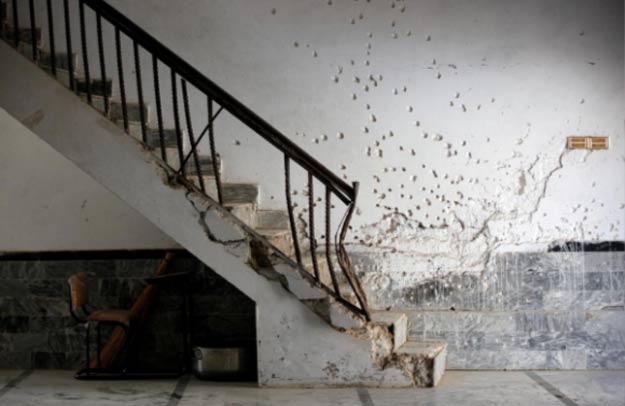Would-be suicide bomber sheds light on suspected Pakistani militant web
Usman's testimony describes a web of radical seminaries and training and bomb making facilities

A policeman in plain clothes (L) walks out of a damaged house, which witnesses said belonged to Hafeez Brohi, wanted in connection with bombings in Shikarpur and suspected in many other blasts in Sindh province. PHOTO: REUTERS
Usman's testimony, a copy of which has been seen by Reuters, describes a web of radical seminaries and training and bomb making facilities stretching from eastern Afghanistan, where the young man was recruited, to Sindh.
Hundreds of people have been killed in attacks on Pakistan's small Shia community, heightening fears in the Sunni-dominated country of an escalation in sectarian bloodshed that has been a persistent threat for decades. Pakistani police believe the network, which Usman says aided him on his 2,000 km journey, has also helped Islamic State spread its extremist agenda in South Asia, even without proven operational links with its core in the Middle East.
Sindh's most wanted all in one book
The Pakistani network brings together several known militants belonging to extremist groups that have targeted religious minorities for decades, police said, providing fertile ground for Islamic State's ideology to spread.
Usman's confession does not name Islamic State directly, but police say they believe the network that recruited and trained him was behind five deadly sectarian bombings in Pakistan, four of which have been claimed by the group based in Syria and Iraq.
"ISIS (Islamic State) has no formal structure (in Pakistan). It works on a franchise system and that is the model that is being used in Pakistan," senior Counter Terrorism Department (CTD) officer Raja Umer Khattab told Reuters. By that he said he meant Islamic State could claim attacks as its own, even if it had no direct role in coordinating them.
Usman, 18 at the time of the thwarted attack, is currently on death row in the town of Shikarpur, where he was caught. Reuters was unable to contact him for this story, but Usman's court-appointed lawyer said the family had shown no interest in the case.
"I am not sure if an appeal has been filed against the sentence, since no one from his family ever turned up to even meet Usman," advocate Deedar Brohi told Reuters, adding that his client had been sentenced by an anti-terrorism court in March.
Parachinar wrecked by back-to-back blasts
Police say the network emerged relatively recently - the main suspects became known to police over the last two years - but it is not clear whether it is acting alone or on the orders of other groups like Islamic State.
"You should join jihad"
Under interrogation, Usman, arrested last September, described his recruitment in the eastern Afghan province of Nangarhar, where US and Afghan forces have been fighting a local offshoot of Islamic State estimated to number a few hundred fighters.
Originally from the Pakistani valley of Swat, his family fled to Nangarhar after his father, a member of the Pakistani Taliban, was killed in a drone strike. Usman told investigators he came home one day to find his brother sitting with an older man.
"My brother said that you should join jihad ... you should become a suicide bomber," Usman said in the confession. He left that day and travelled with the older man by bus to the Afghan province of Kandahar, where they crossed into Balochistan.
From there, they rode a motorcycle to the remote desert town of Wadh in southern Balochistan, where Usman began his training and stayed at the home of a man called Maaz.
"In our room, Maaz took out explosives from a bag and prepared two suicide jackets," Usman told investigators. Police suspect Wadh is where several militant movements, including al Qaeda, the Pakistani Taliban and other local banned groups, have been active.
The media wing of Pakistan's military did not respond to requests for comment for this article, including how militants could use Wadh as hub. An intelligence official, who declined to be named because he was not authorised to speak to the press, denied Wadh was part of a militant network.
"No training camp in Wadh or safe (haven) for militants now," the official said in a Whatsapp message.
 A policeman (L) and residents walk past a shop displaying the pictures of men, who were killed in a suicide blast on January 2015, in a Shia mosque in Shikarpur. PHOTO: REUTERS
A policeman (L) and residents walk past a shop displaying the pictures of men, who were killed in a suicide blast on January 2015, in a Shia mosque in Shikarpur. PHOTO: REUTERSAfter about a month in Wadh, Usman said he travelled by motorcycle with an escort on dusty back roads to Shikarpur. A few days later, he was dispatched with his explosives vest to attack a prayer meeting attended by Shias.
The attack failed when one worshipper spoke to Usman in the local Sindhi language, which he could not understand. A crowd gathered and grabbed him before he could reach his detonator.
72 dead as suicide bomber strikes inside Lal Shahbaz Qalandar shrine in Sehwan
 A policeman gestures beside a wall with shrapnel-scars, which witnesses said was damaged in a suicide blast on January 2015, in a Shia mosque in Shikarpur. PHOTO: REUTERS
A policeman gestures beside a wall with shrapnel-scars, which witnesses said was damaged in a suicide blast on January 2015, in a Shia mosque in Shikarpur. PHOTO: REUTERS A general view of a wall with shrapnel-scars, which witnesses said was damaged in a suicide blast on January 2015, in a Shia mosque in Shikarpur. PHOTO: REUTERS
A general view of a wall with shrapnel-scars, which witnesses said was damaged in a suicide blast on January 2015, in a Shia mosque in Shikarpur. PHOTO: REUTERS"Hate-filled sermons"
Police said another important suspect in the network was Hafeez Brohi, already on Pakistan's wanted terrorist list. He comes from Shikarpur, and it was at Brohi's residence that they said the teenager stayed before the failed attack.
Usman did not name Brohi directly but said a man named Umer Hafiz, who police officials say was actually Brohi, took him from Wadh to Shikarpur by motorbike.
Usman's police case file also identifies Brohi as one of the main suspects in the failed bombing. Case files seen by Reuters on several other sectarian attacks in Shikarpur also single him out.
The town itself, some 250 km east of Wadh but several times that distance by road, is seen as an increasingly important centre of sectarian extremism, according to officials from the counter terrorism department.
Two local Shia mosques were targeted by attacks in 2015. Several new madrassas have been built in the area in recent years, and members of the Shia minority suspect that they are used by Sunni hardliners to spread religious intolerance.
"The madrassas are concentrated in remote villages," said Syed Atta Hussain Shah, the imam of the Shia mosque in Shikarpur. "Preachers show up from elsewhere and stay in these madrassas and deliver hate-filled sermons."
Police officials said they suspected Brohi was the point man for the network in southern Sindh province and was involved in the bombing at Sehwan Sharif shrine that killed 90 people - the most deadly attack in Pakistan claimed by Islamic State.
Brohi has been in hiding for the last three or four years, according to CTD officials. Usman was sentenced to death in March along with 10 militants in absentia, including Brohi.



1724319076-0/Untitled-design-(5)1724319076-0-208x130.webp)















COMMENTS
Comments are moderated and generally will be posted if they are on-topic and not abusive.
For more information, please see our Comments FAQ